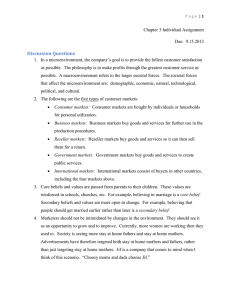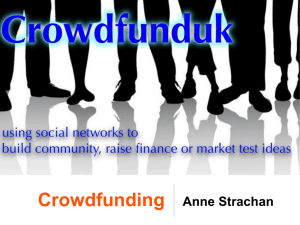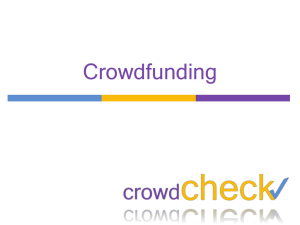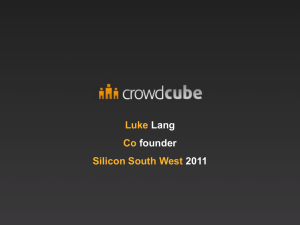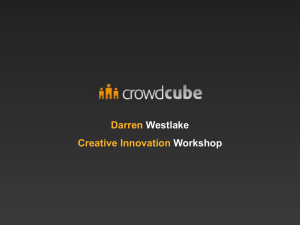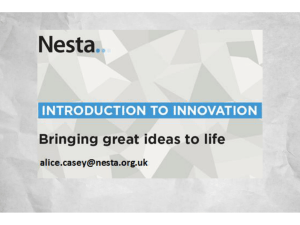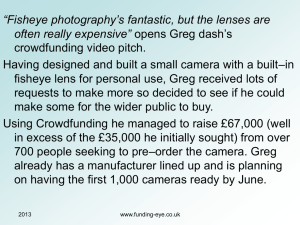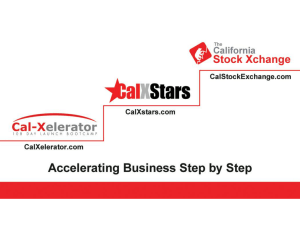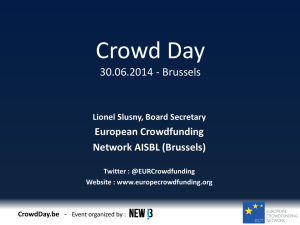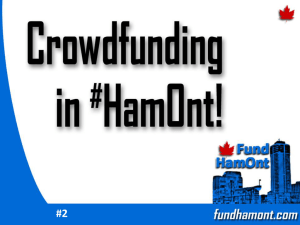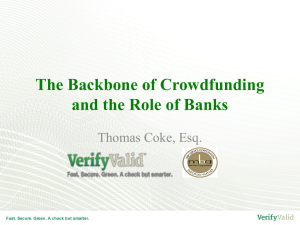Crowdfunding
advertisement
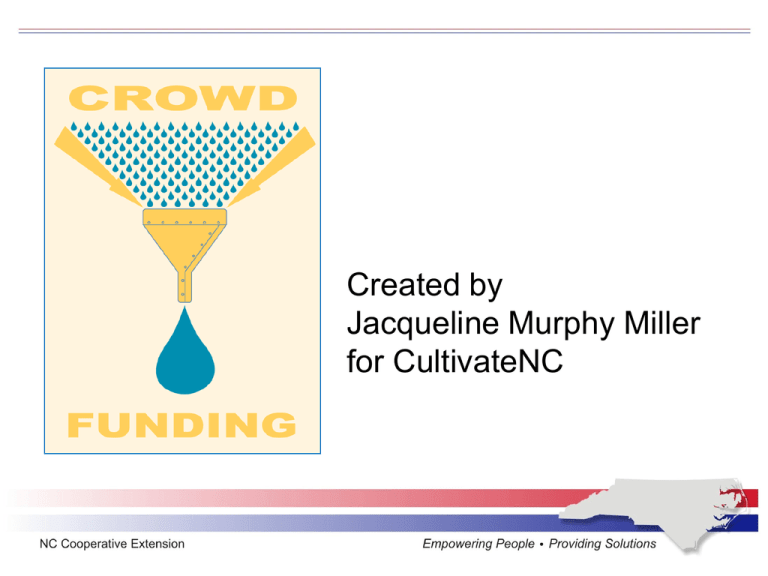
Created by Jacqueline Murphy Miller for CultivateNC What is Crowdfunding? Crowdfunding is a method for obtaining project funding, by soliciting contributions from a large group of people, and especially from an online community. http://en.Wikipedia.Org/wiki/crowdfunding Crowdfunding isn’t really new Early crowd funding efforts can even date back to the 18th century when writers and musicians gathered money from many investors to publish large pieces of work. Giveforward One of the earliest crowdfunding platforms was launched in 2008 after its co-founder could not find a meaningful way to help families affected by Hurricane Katrina. Giveforward motto “We’re here to help if you’re looking for a way to raise funds for friends or loved ones in need.” KICKSTARTER Another early crowdfunding platform that has generated huge success is KICKSTARTER. KICKSTARTER specializes in creative projects such as films, games, art and technology. http://www.kickstarter.com/hello?ref=nav KICKSTARTER • $850 million pledged • By more than 5 million people • Funding more than 50,000 creative projects http://www.kickstarter.com/hello?ref=nav More than 500 crowdfunding platforms Why does it work? Small donations from many people can raise a lot of money. By tapping into your online social connections, you can reach a much broader audience in less time than traditional fundraising processes. Examples of Crowdfunding sites • Crowdfunder (specializes in business and tech start-ups) • Crowdrise (funds charities & causes) • Quirky (funds for inventors) • Invested.in (to create your own funding community) • Indiegogo (no specialization) Crowdsourcing or Crowdfunding? Crowdfunding falls under the Crowdsourcing umbrella, but not all crowdsourcing services are looking for donations. Some crowdsourcing sites collect innovative ideas or work on problem solving questions Two basic models for fundraising 1. Donation based 2. Investment based The Process Create a Page Spread the Word Collect Donations Selecting a Crowdfunding Service The Giveforward website offers four suggestions or things to think about if you are considering using an online crowdfunding service. http://www.giveforward.com/s/learn/ Choose a user friendly service Navigate through the website. • Does it make sense to you? • Do you like how the pages look? • Can you easily update and edit the information? Website Tools The best crowdfunding website will have social tools to assist in sharing your fundraiser on social media. Make sure the website has Facebook and Twitter applications as well as an easy way to share via email. Fundraising Coaches Check to see if the people behind the website are accessible. Do they have email addresses, a live chat, a phone line, or all three? It is very important that you feel the website and the team behind it are honest, responsible, and legitimate. Fees Normal fees for personal fundraising sites range from 7% to 12%. Some organizations charge the credit card processing fees to the donor; others roll the fees into the organization service charges. This information came from the Give Forward online crowdfunding website. Example All-or-nothing funding is a core part of KICKSTARTER If a project is successfully funded, they apply a 5% fee to the funds collected plus credit card processing fees of 3 to 5%. Read the fine print and get legal advice Crowdfunding Directory http://www.crowdsourcing.org/directory Watch a crowdfunding success story from Tarboro, NC. http://www.indiegogo.com/projects/tarborobrewing-company--2
